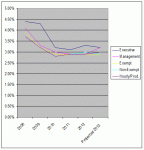18 Questions for Comp Managers in 2013
Here are the questions Neelman asks clients to help them complete their planning for 2013. Neelman is a principal and senior consultant with Compensation Resources, Inc. in Upper Saddle River, New Jersey. Who are your best employees? Which employees truly impact your success? What employees can you least afford to lose? What are your strategies […]



